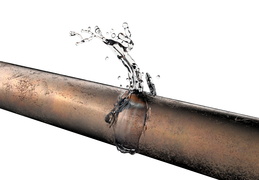Pinhole leaks. The words don’t sound too intimidating, do they? But these leaks are an insidious and common problem that affects the plumbing in many homes. We want to help you understand what they are so you’ll know what to do when you encounter them.
The term pinhole leaks refers to extremely small holes that develop in pipes. These holes can be so small that you can only see them with a magnifying glass. There are several factors that can cause pinhole leaks: corrosion, chemicals in the water, water velocity, and sometimes manufacturing defects.
The most common cause by far is formicary corrosion, a type of corrosion that can affect copper pipes, which are otherwise resistant to most forms of corrosion. Formicary corrosion is highly common in older pipe materials like galvanized steel, so if you live in a home that was built before 1970, pinhole leaks are something you need to keep a close watch for.
Why Pinhole Leaks Are a Problem
Describing pinhole leaks might make them seem like a minor issue. How much water can leak out of a hole that small? The answer is quite a lot! Given enough time, the water loss can be substantial. Since pinhole leaks are hard to notice, they can have plenty of time to cause problems…
- Increased water bills: The constant drip of water, even at a slow rate, will add up over time, leading to higher utility costs. That little drip can go a long way, and if you have multiple pinhole leaks occurring around the house, you may waste hundreds of dollars each year.
- Water damage: Persistent leaking can result in water stains, discoloration, and deterioration of walls, ceilings, and floors. This damage may compromise the structural integrity of those areas.
- Mold and mildew growth: Accumulated moisture from pinhole leaks creates an ideal environment for the growth of mold and mildew. These can pose health risks to your household.
- Decreased water pressure: Pinhole leaks may result in reduced water pressure in affected areas of the home. This can affect the performance of faucets, showers, and other water-using appliances.
- Corrosion and pipe Deterioration: Corrosion not only can cause pinhole leaks, it can also be caused by them. If left unaddressed, the leaks will lead to further corrosion and deterioration of the affected pipe and possibly the pipes around it. That probably means even more leaks.
- Structural damage: Water damage from pinhole leaks can extend beyond visible surfaces and affect the structural parts of your home. You may end up having to pay for repairs and water damage remediation.
- Electrical hazards: If pinhole leaks occur near electrical wiring or outlets, there’s a risk of electrical hazards. Water and electricity are a dangerous combination, and leaks near electrical systems pose a safety risk.
- Damaged insulation: Pinhole leaks can saturate insulation materials in your walls and ceilings, reducing their effectiveness and harming your home’s energy efficiency.
Call the Professionals
If you’ve noticed high water bills, discolored stains on your walls and ceilings, or mold and mildew growth, we recommend calling us to inspect your plumbing and see what repairs need to be made. We’re the general plumbing contractor in Stuart you can trust for any job.
For Red Carpet Service Every Time, Contact General Plumbing and Air Conditioning in Lake Worth, FL.

